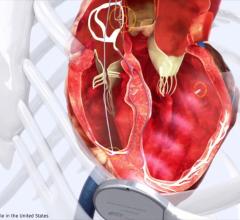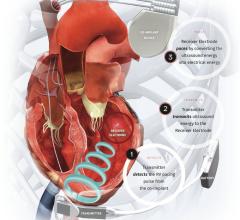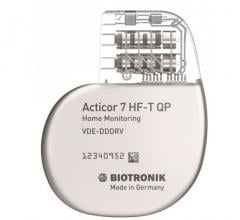
Earlier this year, Medtronic began a worldwide pivotal study evaluating its investigational Extravascular Implantable Cardioverter Defibrillator (EV ICD) system to treat dangerously fast heart rhythms. The EV ICD system is designed to deliver lifesaving defibrillation and pacing therapy via a device the same size as traditional, transvenous ICDs, but with a lead (thin wire) placed outside the heart and veins.
Cardiac rhythm management (CRM) devices in use today are evolving to raise the bar beyond monitoring and managing cardiac issues, to restoring, repairing and healing. The use of CRM devices has substantially surged over the past few decades due to increasing life expectancy and constant technological advancements that have extended their scope and abilities.
An aging world population along with the introduction of advanced cardiac management, monitoring and treatment options for heart arrhythmias is propelling the growth of global CRM devices market. The field has also witnessed significant R&D contributions from leading biotech firms.
For instance, in May 2019, Biotronik conducted a first-of-its-kind, large-scale prospective study, called BIO-LIBRA, to analyze sex-specific outcomes of cardiac defibrillator therapy in patients with non-ischemic cardiomyopathy (NICM). The study was focused to determine whether men and women respond differently to the treatment. A minimum of 40% female enrollment was aimed for the study to adequately analyze the effectiveness of defibrillator therapy.
Heart disease is the leading cause of death in both men and women, yet previous CRM device studies have lacked a proportional representation of women. With the BIO-LIBRA study, Biotronik aimed to identify and analyze data that may enable the team to allow for different device strategies between the sexes.
Another study was recently started by Medtronic to test the effectiveness of its extravascular implantable cardioverter defibrillator (EV ICD) technology for the treatment of dangerously fast heart rhythms. Medtronic’s EV ICD system delivers lifesaving pacing therapy and defibrillation through a device similar to conventional transvenous ICDs, but with a thin lead wire located outside the heart.
According to the World Health Organization (WHO), cardiovascular diseases result in close to 17.9 million fatalities every year. Cardiovascular diseases are very commonly known as the ‘silent epidemic’ since they are slow to show symptoms. In addition, they are estimated to be one of the most expensive health conditions to treat.
Researchers and healthcare professionals claim that early detection is the key to prevention. However, that can only be achieved through constant monitoring, as early symptoms of heart diseases are hard to spot. That is why cardiovascular diseases have been so challenging to prevent and cure, until the advent of pocket-sized, user-friendly technologies.
The Stanford Biodesign New Arrhythmia Technologies Retreat is scheduled to be held in San Diego, California, in May 2020, to shed light on the latest and emerging technological trends in arrhythmia therapy. The retreat aims to serve as an expert forum of around 60 researchers and innovators to explore new and emerging technologies in the detection and diagnosis of arrhythmia.
Recent Regulatory CRM Device Approvals
The U.S. Food and Drug Administration (FDA) cleared several new cardiac rhythm management technologies.
In March 2019, The FDA cleared a couple of high-voltage CRM devices, Rivacor and Acticor, designed by Biotronik to treat patients with cardiac arrhythmia. With the FDA approval, Biotronik’s Rivacor and Acticor brands became the slimmest, smallest 3 Tesla (3T) MR-conditional cardiovascular devices available in the U.S. market.
Medtronic’s exclusive CareLink SmartSync Device Manager also gained FDA approval in May 2019. The application helps healthcare professionals handle and program data from Medtronic’s BlueSync-equipped implanted CRM devices via an Apple iPad.
The company had also launched the MyCareLink Heart mobile application in January. The app enables users to interact with compatible cardiac devices using smart, Bluetooth-enabled technology.
How is Wearable Technology Transforming the Future of CRM Devices?
With rising indications and accessibility to CRM as well as cardiac implantable electronic devices (CIEDs) around the world, the number of patients needing CIED follow-ups is subsequently increasing. In addition, technological innovations have resulted in the emergence of remote monitoring (RM) as an effective alternative to routine in-office patient care.
The use of wearable tech in healthcare and its application potential in cardiology has been one of the hottest topics in recent years. Smartwatches and fitness trackers are no longer the “future” of medicine. These smart devices can not only help monitor physical activity but also provide personalized dietary recommendations, optimize sleep and facilitate medication adherence based on various parameters of the heart.
Recent research and studies have demonstrated the efficacy of smart wearable devices for efficient screening and detection of atrial fibrillation (AFib). The implementation of photoplethysmography (PPG) technology in wearable gadgets such as smartwatches and fitness trackers can effectively enhance AFib screening and detection. Apple Watch is already known to check for irregular heartbeats that could be AFib. The 400,000 patient APPLE HEART Study confirmed this when results were presented at the 2019 American College of Cardiology (ACC) meeting.
Experts claim that in the future, the use of such technologies will enable patients to keep track of their heart health anywhere. Moreover, incorporation of artificial intelligence (AI) and other advanced technologies in CRM devices will further help patients monitor their cardiac health by notifying them and their physicians in case of abnormal activity.
Cardiac rhythm management devices have stood the test of time and innovations in healthcare will further propel the application outlook of these life-saving products that have kept hearts beating for over half a century.
Editor's note: The author Hrishikesh Kadam is a graduate in electronics and telecommunication engineering and blends his technical knowledge and expertise in articles in healthcare and technology for Global Market Insights. The healthcare technology market research firm has a market report dedicated to global cardiac rhythm management devices available at www.gminsights.com/industry-analysis/cardiac-rhythm-management-devices-market
Related CRM Content:
New Technology and Market Challenges Facing Implantable Cardioverter Defibrillators
Heart Rhythm Society 2019 Late-Breaking Clinical Trials
4 Key Takeaways From the 2019 Heart Rhythm Society Meeting
Use of the Interventional CRT Approach to Solve Issues With LV Lead Placement
VIDEO: Use of an Antibacterial Envelope to Reduce Infections for Pacemakers, ICDs
FDA Issues Safety Alert on Cybersecurity Vulnerabilities of Medtronic ICD, CRT Devices


 July 21, 2025
July 21, 2025 









